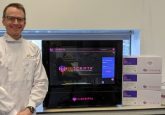Changing the field of genome engineering

The Genome Project-write (GP-write) project is aiming to overhaul and drive forward the field of genome engineering, beginning with the creation of a virus-free cell line.

Nancy J Kelley, President and CEO of Nancy J Kelley & Associates (NY, USA), is a nationally recognized executive and lawyer who has driven key strategic initiatives in science and medicine for over twenty years. She is a leader of the Genome Project-write (GP-write), alongside Jef Boeke, George Church and Andrew Hessel.
Her prior leadership history includes work in scientific institutions, life science companies, and life science real estate development. She was a leader of the East River Science Park project in Manhattan (NY, USA) and has overseen major development projects for clients such as the National Institutes of Health, Johns Hopkins University (both MD, USA), the Massachusetts Institute of Technology and Boston University/ Boston Medical Center (both MA, USA).
Ms Kelley currently serves or has served on boards for the New York Genome Center, The Jackson Laboratory, Beth Israel Deaconess Medical Center, and the Whitehead Institute. She holds a BA in Economics from Yale College (CT, USA), a JD from Harvard Law School (MA, USA), and a MPP from the Harvard Kennedy School (MA, USA).

Please can you provide a brief overview of the aims of GP-write?
GP-write is an open, international research project whereby a multi-disciplinary group of scientists work towards a goal of overseeing a reduction in the cost of engineering and testing large genome cell lines by 1000-fold within 10 years.
It is similar to the goal of the Human Genome Project, which was to not only sequence a human genome and to learn about the blueprint of life, but also to drive technology, development and reduce the cost of sequencing. That project was spectacularly successful – the human genome was nearly completed in 2003 at a cost of 3 billion US dollars. Today you can sequence the human genome for less than 1000 US dollars in under a day.
That’s how far the technology has taken us. In terms of engineering biology, or genome synthesis, we still have a long way to go. This project is really hoping that by drawing attention and creating an international community that’s working together on a number of pilot projects and some larger projects; we will be able to drive the cost of engineering and testing large genomes down.
When did GP-write first begin and what key developments have happened over this time?
The first meeting was held in 2015 at New York University (NY, USA) in Jef Boeke’s lab. 30 scientists came from across the country to provide their thoughts about synthesizing a human genome and some ideas about pilot projects around that.
There was high enthusiasm; a lot of excitement in the room and at the end of the meeting, the GP-write leadership group invited all of the scientists that participated to join in as authors on a commentary in Science that would be calling for involvement in the GP-write project or at that point, the Human Genome Write Project.
We wrote the paper for Science and it was accepted. Our second meeting was held in May 2016 at the Harvard Medical School (MA, USA). There were about 130 scientists from around the world, with panels of ethicists and scientists and industry talking about the importance of this project and how it could move forward. There, we really introduced the ideas to the community and brainstormed about how such a project could be organized and developed.
There was a little bit of controversy surrounding that meeting because some of the scientists that weren’t there were critical of the notion of synthesizing a human genome. There was a lot of press coverage of the meeting and the Science article was published shortly after so we were able to talk to the press and the scientific community about what happened. We believe in working transparently and responsibly. There was tremendous coverage and it garnered interest from all over the world.
For the next year, we continued to speak to the scientific community and to the press. We revised the concept of the project and changed the name to GP-write. The new concept being that we would not only work with the human genome but also with genomes of model organisms and plants.
As we were having these conversations, scientists started writing and expressing their interest in participating in GP-write. By the time the third meeting was held in 2017, we had almost 200 scientists signed up to participate in the GP-write consortium from 15 countries, who represented more than 100 institutions and companies.
During this time, we also organized The Center of Excellence for Engineering Biology, which administers GP-write and supports the formation and work of multi-institutional and interdisciplinary research teams working in a highly integrated fashion, responsive to and engaged with a broad public outreach.
In May 2017, we held the third meeting with 250 scientists from 10 countries and many funders from different governments. The meeting was a two-day meeting, with presentations and a lot of pilot project suggestions. Currently, about 20 of them have been reviewed and some of them approved and there’s more in the pipeline.
Nine working groups were also formed around a number of different topics: an ethical, legal and social advisory board that includes policy considerations; technology and infrastructure development; high performance computing and data infrastructure; safety engineering; standards; intellectual property; communications; education.
In May 2018, we held a scientific-focused meeting at which all of the working groups presented their charter and road maps to each other and feedback was given. We are now finalizing those documents so that they can be posted to a preprint server, which would be a major milestone for the project.
Also at the May meeting, we announced the first community-wide project – the creation of a virus-free cell line. We also announced an industry advisory board, of which the founding members are LabCyte (CA, USA), GenScript (NJ, USA) and Twist Bioscience (CA, USA). They are each developing their own programs for scientists in the project, including discounts on instruments and reagents, early access programs and grants for pilot projects.
There were also a series of presentations by the different countries around the world about what they’re doing and there’s a lot of exciting developments. In China, the government has pledged about 250 million US dollars and formed a new institute. While in Japan, they’ve started a 7 year program with a 50 million US dollar commitment.
Countries all over the world are organizing and forming their own programs around engineering biology and funding them. So that’s been a major development for the project and collective. A lot of milestones were met at the last meeting.
How do you go about organizing a project on such a large scale and what’s the importance of having such an international project for scientific progression?
It’s difficult to organize a project like this on a large scale. Right now, it’s a loosely formed consortium of scientists who are collaborating with each other and meeting to advance the field of engineering biology in general. Moving into the first community-wide project, we’re going to need to figure out how to organize the different countries around this project and a scientific executive committee has begun to examine and discuss that.
One of the models I think we can take a look at is Sc2.0, the Synthetic Yeast Genome Project. This was started by Jef Boeke and involved an international consortium similar to that one that GP-write has. They’re finishing up their work right now, it’s been a very successful collaboration and they have a charter that governs the behavior of the scientists involved. Each of the scientists in an institution has to sign an agreement to participate in it and I think you’ll see something like that happening with GP-write over time.
What will be the implications of reaching these targets that you’ve set out in the project?
The implications will be for many, many different fields. Obviously human health is one of them, but this extends to energy, agriculture, new materials, food. There’s so many ways that this will have an impact on the world and in terms of the benefits for human health.
For example, the average human life span continues to expand as a result of advancements in science and medicine. A challenge today involves living healthy, extended lives with minimal burden of disease. GP-write is uniquely positioned to address that challenge. A few of the applications could be growing transferable human organs – saving the lives of thousands who die waiting for donated organs; engineering immunity to viruses in cell lines; immunity to cancer, radiation and other things. Engineering cancer resistance into therapeutic cell lines has great implications for pharmaceutical developments. So, this could really make a big difference in the world as we know it.
Is there anything else you’d like to add?
The project has attracted a lot of funding to the individual laboratories of scientists that are involved and to the countries that are participating. But, we are still looking for people who are interested in backing this project; not only the science but also helping us to organize so that we can manage this large international consortium in the proper manner and save valuable time in achieving our goals that will benefit the health and lives of so many people globally. More information is found on our Genome Project-write website, which is continually updated.





